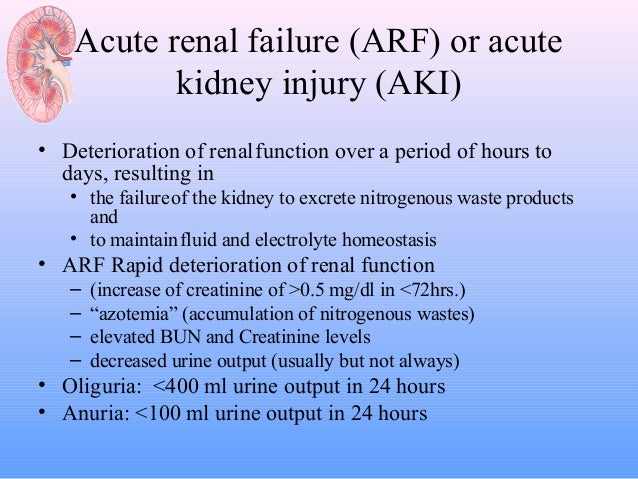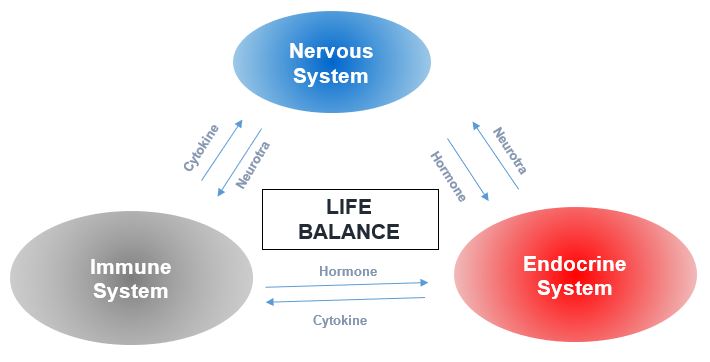Chronic kidney disease (CKD) is a type of kidney disease in which there is gradual loss of kidney function over a period of months to years. Initially there are generally no symptoms; later, symptoms may include leg swelling, feeling tired, vomiting, loss of appetite, and confusion.
Chronic Kidney Disease answers are found in the Nutrition Guide for Clinicians powered by Unbound Medicine. Available for iPhone, iPad, Android, and Web. CAD is the most common cause of death in CKD patients; they are more likely to die from cardiovascular disease than they are to progress

immunity

aki arf fena diagnosis urea deterioration sediment atn creatinine nephropathy myoglobin


Yes Homeopathic completely controls the progression of have seen the patient getting off of dialysis and living normal life with diet control. However, there is no need to reverse the kidney damage in CKD. Most people with CKD are in early stages (stage 1-3). At this stage, the
16, 2013 · Chronic kidney disease affects approximately 10% of the Western population. Recent studies have elucidated some of the immune mechanisms that contribute to kidney injury and disease, which are ...Author: Christian Kurts, Ulf Panzer, Hans-Joachim Anders, Andrew J. ReesPublish Year: 2013
system activation and inflammation have a central role in the pathogenesis of acute kidney injury (AKI) and chronic kidney disease (CKD). Contribution of Inflammation to Renal Disease Inflammation and immune system activation are important causal factors in the development of both acute and chronic renal : John D. Imig, Michael J. RyanPublish Year: 2013
Chronic kidney disease (CKD) is a major cause of morbidity and mortality worldwide, imposing a great burden on the healthcare system. Regrettably, effective CKD therapeutic strategies are yet available due to their elusive pathogenic mechanisms. CKD is featured by progressive inflammation
Learn about chronic kidney disease (CKD) by using this guide about causes, symptoms, tests How is CKD treated? Kidney-friendly diet for CKD. Find kidney-friendly recipes on Kidney Kitchen. Anyone can get CKD. Some people are more at risk than others. Some things that increase your
Acute kidney disease (AKD) - which includes acute kidney injury (AKI) e and chronic kidney disease (CKD) are highly prevalent among hospitalized patients The present guideline is aimed at providing evidence-based recommendations for clinical nutrition in hospitalized patients with AKI/AKD or CKD.



immunity low concept
Chronic kidney disease (CKD) affects an estimated 1% to 3% of all cats and to of all Nephron damage associated with CKD is usually irreversible and can be progressive (Figure 1). CKD is a major cause of morbidity and mortality, especially in older dogs and cats.
Chronic Kidney Disease (CKD) Management in Primary Care. Preventing acute kidney injury in CKD. • If patients become ill and are unable to maintain adequate fluid intake, they should be advised to withhold medications which will increase the risk of decline in kidney How to assess eGFR18.
PDF | Chronic kidney disease (CKD) and end-stage renal disease (ESRD) are This phenomenon persists despite dialysis-related triggers of immune deregulation having been largely eliminated. Here we propose a potential immunoregulatory role of the intestinal microbiota in CKD/ESRD.
Introduction Optimal management of patients with chronic kidney disease (CKD) requires appropriate interpretation and The prevalence of CKD Stages 2-5 has continued to increase since 1988 as have the This decrease was reflected in CKD Stage 1 as Stage 3 increased to from 2003-2006.
The question arises: how to increase immunity? How to prevent the occurrence of dangerous diseases? What can help strengthen the body? To raise and strengthen immunity, in principle, is not such a difficult problem. The main thing is to want to do this without fear of the words "hardening"...

uti pca improves frailty frail ckd urinary tract investigators

proven increase ways
a study of 32 peritoneal dialysis (PD) patients who received hepatitis B vaccine, the weekly Kt/V was better in seroconverters than that in nonconverters ( vs. ).[29] Hepatitis B Virus Vaccine. One of the most studied vaccines in CKD patients is hepatitis B.
Kidney Disease in the United States, 2021 ... levels—all factors that increase the risk for heart disease and stroke—is very important for people with CKD. ... A weakened immune system, which make it easier to develop infections. Loss of appetite or nausea.

immunity disease
Chronic kidney disease (CKD) is defined as an abnormality of the kidney structure or function for ≥ 3 months. The most common causes of CKD in the United States are diabetes mellitus, hypertension, and glomerulonephritis. Since the kidneys have exceptional compensatory mechanisms,
could increase the reduced tetanus vaccination response in uremic rats (IV). We aimed to study the immune effects of ancillary treatments in CKD, calcitriol (III) and Epo (V), on lymphocyte functions. Subjects and methods. The groups in the clinical studies consisted of patients with all stages of CKD and controls from Tampere University
Chronic kidney disease (CKD) and end-stage renal disease (ESRD) are associated with systemic inflammation and acquired immunodeficiency, which promote cardiovascular disease, body wasting, and Here we propose a potential immunoregulatory role of the intestinal microbiota in CKD/ESRD.
Patients with CKD exhibit a disproportionate burden of cardiovascular mortality, which likely stems from the CKD-associated intestinal dysbiosis may also be accompanied by defects in intestinal barrier function When increased absorption is coupled with decreased clearance by the kidneys, levels
Chronic kidney disease (CKD)—or chronic renal failure (CRF), as it was historically termed—is a term that encompasses all degrees of decreased renal function, from damaged-at risk through mild, moderate, and severe chronic kidney failure. CKD is a worldwide public health problem.

kidney diseases related rise way
Chronic kidney disease (CKD) patients have an accelerated atherosclerosis, increased risk of thrombotic-ischemic complications, and excessive mortality rates when compared with the general population. Endothelial Damage, Inflammation and Immunity in Chronic Kidney Disease.
Chronic kidney disease (CKD) is associated with an increased risk for cardiovascular events. Further trials including patients with CKD will be necessary to assess the. @article{Zewinger2016InnateII, title={Innate immunity in CKD-associated vascular

ckd anemia management essential treatment patients
They demonstrated that in patients with CKD stage 1-4 dietary salt restriction per se resulted in improvement of both clinical as ambulatory systolic and Inammatory Eects of Salt. Similar to other chronic diseases, CKD is accompanied by low-grade inammation, which plays a part in

About Chronic Kidney Disease. CKD is progressive loss of renal function, beginning with asymptomatic kidney damage and potentially This guide is written for primary care practice teams and is intended to raise awareness of disparities in CKD and improve the care of vulnerable
Patients with CKD often display chronic increase in markers of inflammation, a condition that seems to be intensified by the disease progression and onset of hemodialysis. Systemic inflammation is related to malnutrition and muscle protein wasting and is involved in many morbidities
, kidney failure affects general immunity, causing intestinal barrier dysfunction, systemic inflammation and immunodeficiency that contribute to the morbidity and mortality of patients with kidney disease. In this Review, we summarize the recent findings regarding the interactions between the kidneys and the immune : Christian Kurts, Ulf Panzer, Hans-Joachim Anders, Andrew J. ReesPublish Year: 2013
Anemia is common among patients with chronic kidney disease (CKD). Anemia underlies many of the symptoms associated with reduced kidney function and is Among CKD patients, iron deficiency is a common, reversible cause of anemia and resistance to erythropoiesis-stimulating agents (ESAs).
Avoid Acute Kidney Injury (AKI). CKD patients have increased susceptibility to nephrotoxic agents and are at high risk for AKI. Hemoglobin is used to assess anemia in CKD. More frequent monitoring may be necessary based on severity of anemia and as eGFR declines.

immunity kegan
· If patients have CKD, manage these patients as detailed in the KDOQI CKD Guideline (Guidelines 7-15). BMI Body mass index. CI Confidence interval. CKD. Chronic kidney disease. CNI Calcineurin inhibitor.
15, 2021 · With this Special Health Report, Living Better, Living Longer, you will learn the protective steps doctors recommend for keeping your mind and body fit for an active and rewarding ’ll get tips for diet and exercise, preventive screenings, reducing the risk of coronary disease, strengthening bones, lessening joint aches, and assuring that your sight, …
Primary care professionals are critical to Chronic Kidney Disease (CKD) care. Many CKD care issues overlap with those of diabetes and Developed by the National Kidney Disease Education Program (NKDEP), this guide is intended to help busy health care professionals manage adult CKD patients
Patients with chronic kidney disease (CKD) have an increased risk of infection and poorer responses to vaccination. This suggests that CKD patients have an impaired responsiveness to all antigens, even those first encountered before CKD onset.
The NKF-KDOQI (National Kidney Foundation- Kidney Disease Outcomes Quality Initiative) deni-tion and staging system for chronic kidney disease Subsequent guidelines from NKF-KDOQI include 2 publications concerning bone metabolism and disease in patients with CKD (recommendations
Many patients with chronic kidney disease (CKD) are less physically active and have reduced physical functioning and performance compared to the general population. However, strong scientific research suggests that exercise interventions have the potential to improve several health

immunity boost popsugar

cambridge gurdon wellcome

For patients with chronic kidney disease (CKD), the leading cause of mortality is cardiovascular disease. Increased formation of advanced glycosylation end products (AGEs) in renal dysfunction can also lead to increased carbonyl stress, which can further initiate inflammation in CKD.
In patients with CKD, circulating FGF23 levels are progressively increased to compensate for persistent phosphate retention, but this Therefore, it is apparent that the decrease of renal mass results in the decreased production of BMP-7, causing mineral bone disease in CKD patients [44].
renal function is a significant risk factor for cardiovascular events and death in chronic kidney disease (CKD) patients, and this risk is further increased when CKD has progressed to end-stage renal disease (ESRD) requiring dialysis initiation or kidney : Sawako Kato, Michal Chmielewski, Michal Chmielewski, Hirokazu Honda, Roberto Pecoits-Filho, Seiichi ...Publish Year: 2008
immune system and the kidneys are closely linked. In health the kidneys contribute to immune homeostasis, while components of the immune system mediate many acute forms of renal disease and play a central role in progression of chronic kidney disease. A dysregulated immune system can have either direct or indirect renal : Josefine Tecklenborg, David Clayton, Stefan Siebert, Shana ColeyPublish Year: 2018
CKD patients with anaemia, erythropoietin titres are not lower but may be equal to or even higher than in normal non-anaemic individuals(1-3). Measurement of erythropoietin level is very rarely helpful. Renal Association Clinical Practice Guideline - Anaemia of Chronic Kidney Disease - June 2017.
need to increase your calories until you are able to reach your normal healthy weight. This takes time, so be patient. Include free foods every day in addition to meats, vegetables, fruits, grains and breads. Dairy products can be allowed in small amounts. Your CKD dietitian will help you adjust your calories as your weight : immunityMust include: immunity
